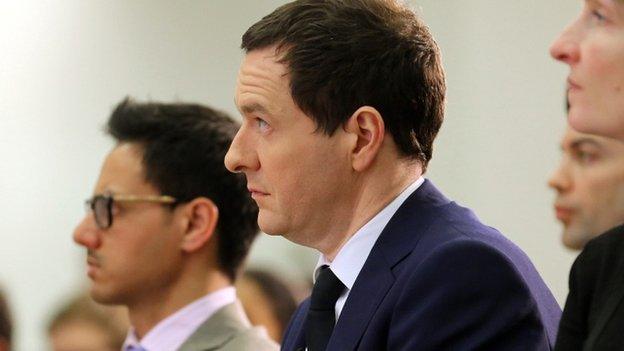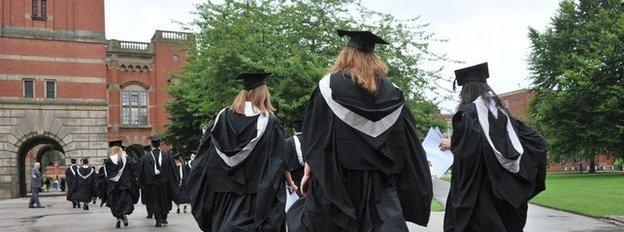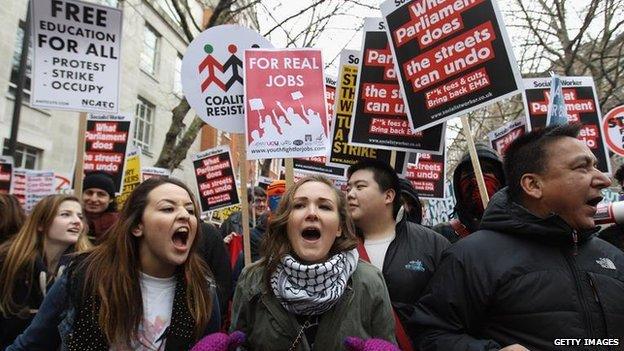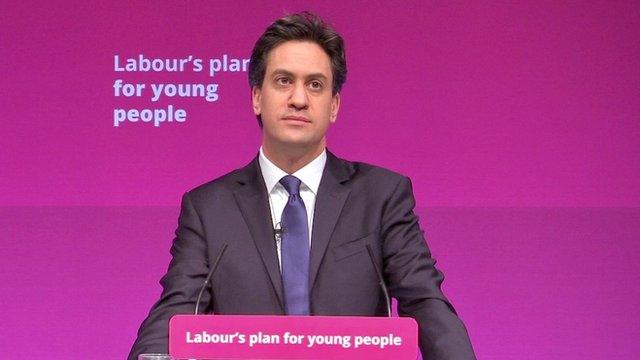Labour promises to cut tuition fees to £6,000
- Published
- comments
Ed Miliband said the government's student fees policy is ''one of the most expensive broken promises in the history of British politics''
Ed Miliband says Labour would cut university tuition fees in England to £6,000 per year from autumn 2016.
He says a Labour government would pay for the fee cut from £9,000 by reducing tax relief on pensions for those earning over £150,000 per year.
This commitment to cut fees would not be negotiable in any post-election coalition deals, Mr Miliband promised.
Business Secretary Vince Cable attacked the proposals as "fraudulent" and a "tax on pensioners".
Chancellor George Osborne said: "Ed Miliband's sums don't add up because the universities would get less money and there would be fewer students so it's bad for students, bad for universities, bad for the taxpayer and bad for the British economy."
'Keep my promise'
In a speech in Leeds, Mr Miliband said higher fees had been a "betrayal of an entire generation", leaving students with average debts of £44,000 and putting an extra burden on public finances.
And he attacked Liberal Democrat leader Nick Clegg for his U-turn on tuition fees, which he said had "left a whole generation doubting politics - doubting anyone can be believed or trusted".
But the Labour leader said there would be no retreat from the fee proposals: "I made you a promise on tuition fees. I will keep my promise."
"£6,000, £9,000 - it's still not going to make much difference": The BBC gets student views
Mr Miliband said reducing tuition fees would save taxpayers £40bn by 2030 - and promised that this was a "fully funded policy" and universities would receive an extra £2.7bn per year to replace the fee cut.
An analysis by the Institute for Fiscal Studies said that overall Labour's policy would "leave university finances largely unaffected in the short run" and "reduce government debt in both the short and long run".
There would be higher interest rates for repayments for those graduates earning more than £42,000, up from 3% to 4%, said shadow chancellor, Ed Balls, in a bid to offset concerns that the biggest winners would be high earners.
But Paul Johnson of the IFS said "the group who will benefit from this are the higher earning half of graduates".
"So those graduates who go on to the best jobs will find that their repayments go down, whereas those graduates who go on to less good jobs will not find any difference in the repayments."
The Labour leader announced an increase of non-repayable maintenance grants by £400 per year to cover students' living costs, up to a maximum of about £3,800.
But these grants are only available to families with a total income below about £42,000 and there have been warnings that young people from "squeezed middle" families do not have access to sufficient student loans, external.
The changes to pensions allowances to fund the fee cut would also mean the lifetime limit on pension pots would be reduced from £1.25m to £1m, and annual maximum contributions to pension pots would be cut from £40,000 to £30,000.
Universities UK welcomed the reassurances on funding for higher education, but warned that "the long-term feasibility of such a promise may be difficult".
Labour and English tuition fees
£9,000
current maximum tuition fees
£6,000
Labour's proposed maximum
-
£21,000 amount students have to earn before paying back tuition fee loans
-
£44,000 average student debt, according to Labour
-
£21bn a year in student loans written off, party says
-
£3.1bn extra annual funding needed under proposals, warn Universities UK
Sir Christopher Snowden, president of Universities UK and vice-chancellor of the University of Surrey, said the proposals would cost £3.1bn of extra public funding each year, which would put pressure on other investment such as research, innovation, and social mobility.
University heads have also argued that the increase in tuition fees to £9,000 has not deterred applications from poorer students.
The announcement of Labour's policy on fees has been much delayed, with reports of disagreements between senior party figures over whether cutting tuition fees should be a priority for investment.
Student debt
Mr Miliband says the current system is putting unacceptable levels of debt on to young people and proving expensive to the taxpayer, because so much of student loans is written off.
"The government has designed a system which is burdening students with debt today and set to weight down the taxpayer with more debt tomorrow," the Labour leader said.

George Osborne warned that "progress would be at risk from this ill-thought out policy"
"This is a system that will have added an extra £16bn more than predicted to public debt by the end of the next Parliament. If left unchecked, the system will have added £281bn to debt by 2030.
"And much of this money will never be paid back. By the late 2040s, student loan write-offs will be hitting £21bn a year - almost double the entire cost of police services in England and Wales. It must go down as one of the most expensive broken promises in history."
Mr Miliband said the tuition fees system was leaving young people worse off than previous generations.
"This is a disaster for them and a disaster for the future of Britain too - a country where the next generation is doing worse than their parents is the definition of a country in decline."

Analysis: Robert Peston, Economics editor

One way of seeing Labour's tuition fee plan is that it is replacing £3.1bn of university financing via student loans with £3.1bn of financing from taxation - through a tax raid on pensions.
But this doesn't mean that tax payers will be £3.1bn a year poorer in the long term relative to the existing debt-funded scheme, because something like half of all the student debt will never be repaid, according to the government's own accounting.
What is unclear is how many people will be affected by the tax reforms - because authoritative data does not appear to exist.
That said the proposed new ceiling on total pension pots of £1m - which would yield a pension of around £30,000 a year - would constrain the pensions of many people - from senior teachers to policemen - who would not remotely be regarded as super rich.
So the pension changes will be seen as hurting the middle class - though maybe they'll be chuffed that the debt burden on their student children will be cut.


The increase in tuition fees prompted waves of protest
Pam Tatlow, chief executive of the Million+ group of new universities, said lowering fees made "good economic sense" over the longer term.
"A reduction in fees has the potential to save the Treasury and taxpayers' money because it will reduce student debt and more graduates are likely to repay their loans.
"There is a strong case for all parties to be more transparent about the real long-term economic costs and benefits of their higher education policies before the election."

The current tuition fee system
In England, fees up to £9,000 per year, repayments begin once students graduate and earn above £21,000. Unpaid debt written off after 30 years
In Scotland, no fees for students from Scotland
In Wales, fees for students from Wales, £3,810
In Northern Ireland, fees for students from Northern Ireland £3,805

John Cridland, director general of the CBI, said funding for higher education had to be maintained, but criticised the raid on pensions allowances.
"A further hit on reasonable expectations on pension tax relief may be politically expedient but risks damaging a savings culture that needs nurturing if the state is to cope with financial burden of retirement benefits in the years to come," he said.
The National Union of Students welcomed the proposed lower fees.
"The current model of university tuition fees is totally unsustainable and these new proposals begin to address this," said NUS vice president Megan Dunn.
"Reintroducing substantial public funding and addressing student debt is progress to what we currently have. The inclusion of a significant increase of maintenance grants will help to address cost of living for the most disadvantaged students, which is frankly nearing crisis point."
Chancellor George Osborne highlighted that the number of disadvantaged students going to university had risen under the current tuition fee system.
"Under this government, we've made real progress in getting students from poorer background to go to universities - something governments have been trying to do for decades. All of that progress would be at risk from this ill-thought out policy."
Vince Cable, Liberal Democrat business secretary, rejected the plan to cut fees.
"This tax on pensioners will not go to universities, it will go to the Treasury. And we know from past experience the Treasury will pocket the money and it will be used to reduce the deficit."
- Published27 February 2015

- Published20 February 2015

- Published19 November 2014
- Published3 February 2015